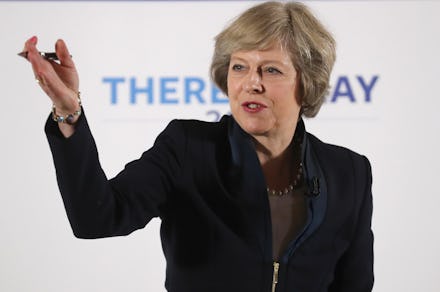Who Is Theresa May, the Presumptive Next Prime Minister of Britain?

After energy minister Andrea Leadsom, the only other contender for leader of the ruling Conservative Party, dropped out of the race Monday, one was left standing: Theresa May, the Home Secretary.
May will almost certainly become the next Prime Minister of the United Kingdom. Current Prime Minister David Cameron announced Monday he would resign on Wednesday and be replaced by May. (He was caught jollily humming to himself after making said announcement, appearing to have forgotten he had a microphone on; Cameron did not look distraught by the decision to resign.)
Leadsom suddenly withdrew after spending the weekend apologizing for remarks in which she said she would be a better leader than May, who is childless, because Leadsom is a mother, giving her a greater stake in the country's future. That, in conjunction with markedly lower support within the party, led to Leadsom's withdrawal, bringing to an end a turbulent battle for leadership precipitated by Brexit.
Cameron declared he would resign on June 24, one day after the Brexit referendum left the UK withdrawing from the European Union. Cameron had driven a hard campaign to remain in the EU.
"I was absolutely clear about my belief that Britain is stronger, safer and better-off inside the European Union," Cameron said at the time of his announcement. "But the British people have made a very clear decision to take a different path, and as such I think the country requires fresh leadership to take it in this direction."
The British parliamentarian system means the leader of the ruling party is automatically the leader of the country. A general election, therefore, will not be necessary for May to become prime minister; she simply needs to succeed Cameron.
One of the Conservative Party's more well-known members of parliament, Ken Clarke, was caught describing May as a "bloody difficult woman" on July 5 prior to an interview; he did not know the microphone was on. May embraced Clarke's aspersion, arguing that was precisely what made her qualified to be PM. Ultimately, the condescending remarks helped May's campaign.
May is regarded as a moderate within the party and looks to exercise more caution with austerity than Cameron, who centered his tenure around shrinking government and social safety nets.
"[S]he also presented herself as a 'one nation' Conservative who would seek to address the needs of the poor and of minorities," the New York Times reports. "She called for greater worker participation on corporate boards, and she suggested that there had to be limits to tax cuts if society was to meet the needs of all of its people."
With more than 60% of the Conservatives — or Tories — supporting her bid for leadership, she is the member most capable of uniting a fractured party, weakened by the contentious Brexit referendum.
May would be the second female to lead the U.K. The first was Margaret Thatcher, who also led the Tories.
The 59-year-old has been Home Secretary since 2010 and, despite supporting the Remain campaign, she clearly indicated on Monday she would honor the referendum results as the country's leader.
"Brexit means Brexit and we're going to make a success of it," May said, according to the BBC.
Read more: